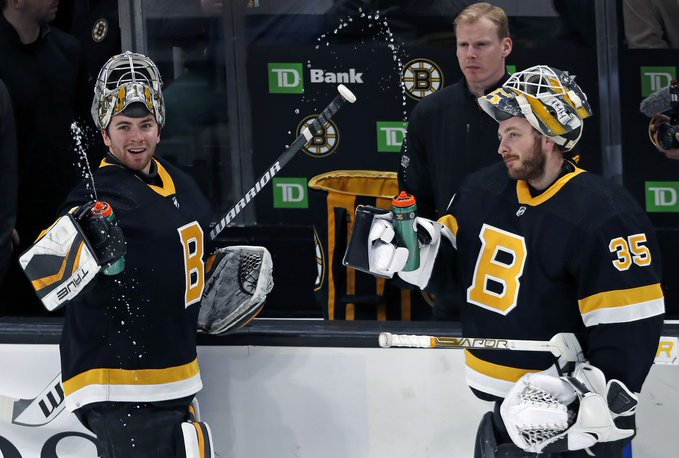This is our last week looking at the goalie situations in each division of the NHL thus far this season. We have already looked at the Central, Pacific, and Metro Divisions, so this week, we will be looking at the best and worst goalie tandems in the Atlantic Division. The Atlantic is full of excellent goalies, and it is the only division where no tandem has a combined save percentage under .900. This means that even though there are some teams whose goaltending is definitely better than others, no team in this division is in a horrible goaltending situation.
The Best and Worst Goalie Tandems in the Atlantic Division so Far This Season
Best: Boston Bruins
Linus Ullmark: 14-1-0; .936 SV%; 1.93 GAA; 1 SO
Jeremy Swayman: 5-2-0; .902 SV%; 2.60 GAA
Was chatting with Linus Ullmark when Jeremy Swayman walked by.
Swayman: “He’s the best there is and ever will be.”
Ullmark: “Why are you talking about yourself in the third person?”
Reasons why Ullmark has been so good for the Bruins, vibes included:https://t.co/vljxN3QbTW pic.twitter.com/8okYKvwxaw
— matt porter (@mattyports) November 10, 2022
One of the reasons that the Boston Bruins have been off to such a hot start this year has been their goaltending, specifically that of Linus Ullmark. Ullmark was above average in his first season with Boston last season, going 26-10-2 with a .917 save percentage. This season, however, Ullmark has been nothing short of sensational. He is currently leading the NHL in wins (14), save percentage (.936), and goals against average (1.93). He has only had four starts this season where he let in more than 2 goals, and none of those 4 starts ended up being losses.
Jeremy Swayman has been hot and cold in his limited use. In his 7 starts so far, Swayman has three starts with a save percentage over .944 and four starts with a save percentage under .875. But overall, he has been a capable backup. Combined, the tandem has a 2.11 goals against average and a .928 save percentage (both top in the division). Their advanced stats are also excellent (0.514 GSAx/60), though not the highest in the Atlantic.
This is mostly because the Bruins are so tight defensively and do not give up a lot of high-danger shots. Boston is currently not just first in their division but also first overall in the NHL, and with goaltending like this, they are likely to stay near the top through the rest of the season.
Honorable Mention: Toronto Maple Leafs (Ilya Samsonov and Matt Murray)
Worst: Detroit Red Wings
Ville Husso: 10-4-3; .912 SV%; 2.58 GAA; 3 SO
Alex Nedeljkovic: 2-3-2; .880 SV%; 3.97 GAA
As mentioned above, despite the fact that I am listing Detroit as having the “worst” goaltending in the division, that doesn’t mean that it is sinking the Red Wings. In fact, the team currently finds itself in the last wild card spot in the East, and it is not inconceivable that Detroit ends up making the playoffs. If they do, however, it will be on the back of Ville Husso and not because they have a solid tandem. Husso has been very solid for a young Detroit team, posting a respectable record and a .912 save percentage and 2.58 goals against average. He is also tied with Connor Hellebuyck for the league lead in shutouts.
Alex Nedeljkovic, however, has been abysmal. He is bottom five in the league for save percentage (.880), goals against average (3.97), and goals saved above expected (-9.5). He has let in four or more goals in five of his seven starts. Because of these poor stats, the combined numbers of the tandem end up being very low. Combined, they have a 3.01 goals against average, a .901 save percentage, and a GSAx/60 of -0.313. Detroit is a young team on the rise, but if they want to be a legitimate playoff contender, they are going to have to find a way to get solid goaltending from both of their goalies.
Dishonorable Mention: Buffalo Sabres (Eric Comrie and Craig Anderson)
Fun Fact: A goalie has won at least 300 games in a decade only 6 times: Terry Sawchuk in the 1950s (311 wins), Tony Esposito in the 1970s (304 wins), Ed Belfour and Patrick Roy in the 1990s (304 and 311 wins respectively), Martin Brodeur in the 2000s (358 wins), and Marc-Andre Fleury in the 2010s (318 wins).



